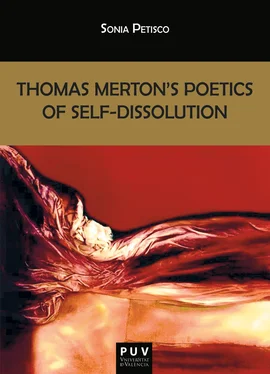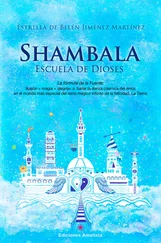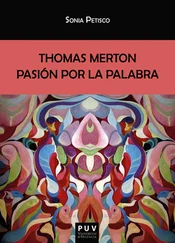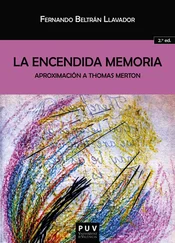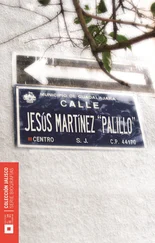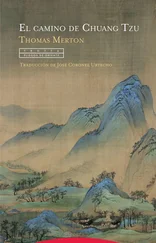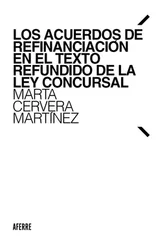Sonia Petisco Martínez - Thomas Merton's Poetics of Self-Dissolution
Здесь есть возможность читать онлайн «Sonia Petisco Martínez - Thomas Merton's Poetics of Self-Dissolution» — ознакомительный отрывок электронной книги совершенно бесплатно, а после прочтения отрывка купить полную версию. В некоторых случаях можно слушать аудио, скачать через торрент в формате fb2 и присутствует краткое содержание. Жанр: unrecognised, на английском языке. Описание произведения, (предисловие) а так же отзывы посетителей доступны на портале библиотеки ЛибКат.
- Название:Thomas Merton's Poetics of Self-Dissolution
- Автор:
- Жанр:
- Год:неизвестен
- ISBN:нет данных
- Рейтинг книги:5 / 5. Голосов: 1
-
Избранное:Добавить в избранное
- Отзывы:
-
Ваша оценка:
- 100
- 1
- 2
- 3
- 4
- 5
Thomas Merton's Poetics of Self-Dissolution: краткое содержание, описание и аннотация
Предлагаем к чтению аннотацию, описание, краткое содержание или предисловие (зависит от того, что написал сам автор книги «Thomas Merton's Poetics of Self-Dissolution»). Если вы не нашли необходимую информацию о книге — напишите в комментариях, мы постараемся отыскать её.
Thomas Merton's Poetics of Self-Dissolution — читать онлайн ознакомительный отрывок
Ниже представлен текст книги, разбитый по страницам. Система сохранения места последней прочитанной страницы, позволяет с удобством читать онлайн бесплатно книгу «Thomas Merton's Poetics of Self-Dissolution», без необходимости каждый раз заново искать на чём Вы остановились. Поставьте закладку, и сможете в любой момент перейти на страницу, на которой закончили чтение.
Интервал:
Закладка:
This poem is based on Rubinus’ Historia Monachorum and it reads as follows:
MACARIUS THE YOUNGER
I
The place in which he lived
Is called Scete.
In wide open desert
A day and night’s journey
From the monasteries at Nitria.
No road, no path,
No land marks
Show the way there.
You must go by the stars.
Scarce is the water:
Where found at all
It smells poisonous as tar
But is safe to drink.
Few live there
Far apart
Out of one another’s sight
True men of God:
Such a place
Suffers only those
Who have made up their minds.
There is great love among them
And love for any other
Who can get that far.
If any traveller
Should reach that place
He receives much care:
One who crosses such wastes
Has needs.
II
Now one day someone brought a bunch of grapes to Macarius at Scete.
He, forgetful of his own thirst, took the grapes to another
Who was unwell.
He in turn, happy and thanking God for so much love
Took the grapes to yet another.
So the grapes went from cell to cell, all around the desert
No one knowing where they first started.
Until at length one came to Macarius, saying: “Here, Father, are good
grapes. Take them, they will refresh you.”
Then Macarius was very glad to see the worth of those men
Who lived hidden in the Desert at Scete. 3
It is obvious that the aforementioned lines are evoking the words pronounced by Jesus two or three times during the Last Supper: “This is my commandment: that you love one another as I have loved you” (John 15:12). The four evangelists insist on this law and St. John in his Gospel develops it in detail, a sort of invitation to community. The new commandment of love confirms this community, (Congregavit nos in unum Christi amor ) which means abandoning the particularity or personality of each of us in favour of the formula “love one another,” with this impersonal “one” at which the English language points. In this regard, the symbol of the grapes might represent the death of the individual which precedes the resurrection of the community or the resurrection of Lógos , a death which for Merton implied a fierce fight against his own biased world views, a destruction and oblivion of his self, his mask, his disguise, the worst of miseries. 4It is utterly impossible to define the nature of communal space, he will tell us. “We all add up to something far beyond ourselves. We cannot yet realize what it is. But we know […] that we are all members of the Mystical Christ, and that we all grow together in Him for Whom all things were created.” 5Let us thus go to the desert among the hearts devoted to God, beata solitudo , not in search of a narcissist dialogue but to engage in compassionate clarity, hearty friendship, and secret philia 6
The next poem is as splendid as it is audacious, and it immediately reminds us of T.S. Eliot in The Waste Land and of García Lorca in Poet in New York . It is included in his book Early Poems (1940-1942) and draws its inspiration from the time when Merton spent several years as a student of English Literature at Columbia University before becoming a monk. It is a direct affront, a genuine portrait of New York’s reality at the time of the Second World War, with many European cities already destroyed and bombarded. In my opinion, the lines of the poem are very close to Christ’s teaching: “If anyone strikes you on the cheek, offer the other also” (Luke 6:29).
Merton does not remain silent but instead, in a kind of painful and jubilant ritual, he spells out city life and its progress, a sort of prison where alienated masses survive and are subdued to the vanity of the faith ruling the world. With an unwonted and ambiguous rhythm throughout the poem, Merton casts an unceasing rain of images shaping a grotesque scenery to denounce the monotony, weariness, luxury, squandering and superficiality of the American society: a whole collective illusion based on false ideas, fantasies and distractions which power imposes on it. We are all accomplices – he explains –, perfectly adapted to a futile world which has lost all its moral values and suffers the ever-growing sadness and condemnation to personal individuality. This is a theme that he further discussed in his essay “Rain and the Rhinoceros.” 7The poet, like Berenger, the main character in Ionesco’s play, challenges “the entire herd” and he urgently gets involved in the task of revealing to us the pack of lies which comprise this reality. This unveiling becomes, without a shadow of doubt, a main source for his rebellion, for all his creative thrust. His cry against money and imposed poverty, true essences of modernity, brings the following poem to an end, leaving it open for further reflection by the reader.
HYMN OF NOT MUCH PRAISE FOR NEW YORK CITY
When the windows of the West Side clash like cymbals in the setting
sunlight,
And when wind wails amid the East Side’s aerials,
And when, both north and south of thirty-fourth street,
In all the dizzy buildings,
The elevators clack their teeth and rattle the bars of their cages,
Then the children of the city,
Leaving the monkey-houses of their office-buildings and apartments,
With the greatest difficulty open their mouths, and sing:
“Queen among the cities of the Earth: New York!
Rich as a cake, common as a doughnut,
Expensive as a fur and crazy as cocaine,
We love to hear you shake
Your big face like a shining bank
Letting the mad world know you’re full of dimes!
“This is your night to make maraccas out of all that metal money
Paris is in the prison-house, and London dies of cancer.
This is the time for you to whirl,
Queen of our hopped-up peace,
And let the excitement of your somewhat crippled congas
Supersede the waltzes of more shining
Capitals that have been bombed.
“Meanwhile we, your children,
Weeping in our seasick zoo of windows while you dance,
Will gobble aspirins,
And try to keep our cage from caving in.
All the while our minds will fill with these petitions,
Flowering quietly in between our gongs of pulse.
These will have to serve as prayers:
“‘O lock us in the safe jails of thy movies!
Confine us to the semiprivate wards and white asylums
Of the unbearable cocktail parties, O New York!
Sentence us for life to the penitentiaries of thy bars and nightclubs,
And leave us stupefied forever by the blue, objective lights
That fill the pale infirmaries of thy restaurants,
And the clinics of thy schools and offices,
And the operating-rooms of thy dance-halls.
“‘But never give us any explanations, even when we ask,
Why all our food tastes of iodoform,
And even the freshest flowers smell of funerals.
No, never let us look about us long enough to wonder
Which of the rich men, shivering in the overheated office,
And which of the poor men, sleeping face-down on the Daily Mirror ,
Are still alive, and which are dead.’” 8
Merton’s contempt for metropolitan life grew bigger and bigger. Faithful to the commands of his own destiny, the monk deemed it urgent to begin a journey from the unreal city (London, New York) to the paradisiacal city (the Trappist community). 9Therefore, at the beginning of the forties, he entered the Abbey of Our Lady of Gethsemani (Kentucky). On joining the monastery in 1941, he wrote a poem entitled “A Letter to My Friends.” It is addressed to his university friends Robert Lax and Edward Rice, with whom he shared many good moments of study and discussion during their time as students at Columbia. They enjoyed a lasting intimate friendship and a close intellectual collaboration witnessed to in their contributions to The Columbia Jester magazine. In the summer of 1939, they spent a few months together at a small cottage situated in the west side of New York State, writing novels, and reading books, amongst which was Finnegan’s Wake by James Joyce. 10
Читать дальшеИнтервал:
Закладка:
Похожие книги на «Thomas Merton's Poetics of Self-Dissolution»
Представляем Вашему вниманию похожие книги на «Thomas Merton's Poetics of Self-Dissolution» списком для выбора. Мы отобрали схожую по названию и смыслу литературу в надежде предоставить читателям больше вариантов отыскать новые, интересные, ещё непрочитанные произведения.
Обсуждение, отзывы о книге «Thomas Merton's Poetics of Self-Dissolution» и просто собственные мнения читателей. Оставьте ваши комментарии, напишите, что Вы думаете о произведении, его смысле или главных героях. Укажите что конкретно понравилось, а что нет, и почему Вы так считаете.
